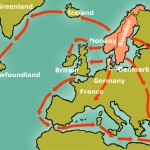Magonia #6: Leland Sings Magonia June 12, 2013
Author: Beach Combing | in : Medieval, Modern
Elizabeth Pennell writes in her memoirs of Charles Leland, the nineteenth-century folklorist and alleged bullshitter: He got well over the gout in the spring and summer of 1891, as he travelled by easy stages several weeks at Via Reggio, Geneva, Homburg to London for his last visit there. He went on with his Heine [the […]
Vision Quest #3: Witch Lotions June 10, 2013
Author: Beach Combing | in : Medieval, Modern
An interesting witch case from fourteenth-century Italy with hints of hallucinogens. The following passages appear in the work of Bernard of Siena (aka Bernardino, and Bernardine) (obit 1444). This, btw, is before the witch craze really catches fire. It has several curious features. I having preached of these charms and of witches and of sorceries, […]
Nine Historical Mysteries June 6, 2013
Author: Beach Combing | in : Ancient, Contemporary, Medieval, Modern
***Dedicated to Moonman*** Thanks to an email from an old friend of StrangeHistory Beach found himself wondering about moments from history that are mysterious, and where this blogger would chop off his own digits to get at the truth. In what follows, he has avoided the classics because, to be frank, he just doesn’t care […]
Lawrence’s Missing Tree May 11, 2013
Author: Beach Combing | in : ContemporaryD.H.Lawrence, the high priest of love, the enemy of the bourgeoisie (and their closest ally), an indifferent stylist, a brilliant novelist and the man our great grandmothers prayed that they would not be seated next to at a dinner party. DHL had a lifelong, masturbatory relationship with Italy: a country that was, in his mythology, […]
Grotesque Mesalliances April 24, 2013
Author: Beach Combing | in : Medieval, Modern
There is a school of thought that says arranged marriages work and, even for die-hard romantics like Beach, there are millennia of proof that they can. But there are also cases from every static, traditional society that leave you shaking at the potential horror of an institution that allows a father or brother to choose […]
The Evils of Chess! April 7, 2013
Author: Beach Combing | in : Contemporary, Medieval, Modern
Chess! The taut, horrid syllable is enough to unveil the rotteneness at the heart of that most dreadful of games. Avoid it! Turn from it! Ostracise those who play it! Ok, Beach is playing out here, but he recently came across this extraordinary quotation from an Anglican vicar from Essex, at the death of his […]
The Name ‘America’ and Amerigo Vespucci March 22, 2013
Author: Beach Combing | in : Medieval, Modern
There are perhaps a score of different theories as to where the word ‘America’ comes from. These range from various Amerindian etymologies to a Bristol-based merchant with the surname Ameryk! The theory which enjoys the greatest prestige though is that America is based on a feminised Latin version of Amerigo, as in Amerigo Vespucci, the […]
Capital Problems March 19, 2013
Author: Beach Combing | in : Ancient, Contemporary, Medieval
Capital cities should represent a country. They should be the head that directs and controls: unless you live in a properly federal society and there are none of those left. But what happens when capitals come to outweigh and dominate the country that they stand in? Take an example from close to this blogger’s home. […]
Pimping Your Noble Sister in Wartime Naples March 16, 2013
Author: Beach Combing | in : Contemporary
Norman Lewis’ Naples ’44 is one of the great works of the Second World War. It describes the most dramatic of places, Naples, under the most dramatic of situations, German and then Allied occupation. Beach was so excited, by his recent playing around with this book, in that tale about Padre Pio the human anti-aircraft […]
Is the Pope Catholic? March 11, 2013
Author: Beach Combing | in : Modern
Here follows a potted biographer of one of those seventeenth-century Quakers who enjoyed riling the world. In fact, this was the period when the Society of Friends was anything but… One case, in London, may be given as an illustration in John Perrot, an Irishman, who during the times of stripping from death or imprisonment […]
Review: Witches, Fantasies and Fairies March 8, 2013
Author: Beach Combing | in : Medieval, Modern
In 1966 Carlo Ginzburg, a WANW Italian historian, published I Benandanti. In this book, Ginzburg argued that a group of sixteenth-century Friulian peasants, who believed themselves to have super powers – they could fly and fight witches – were the last traces of a pre-Christian fertility cult in the region. Ginzburg went on to argue that […]
Who Needs Anti-Aircraft Guns When You Have Saints? March 7, 2013
Author: Beach Combing | in : Contemporary
In Norman Lewis’ brilliant, astounding Naples ’44, the British writer has many curious and memorable passages from his diary of that year. However, this is one of Beach’s favourites. At Pomigliano [north-east of Naples] we have a flying monk who also demonstrates the stigmata. The monk claims that on an occasion last year when an […]
Broad Beans, Paschal Candles and Graveside Stories February 25, 2013
Author: Beach Combing | in : Modern
Popular superstitions survived surprisingly late in many parts of Europe. However, these superstitions had two enemies, Christianity and urbanization, enemies that gradually scoured them out of mind and memory. From the arrival of Christianity on the scene (any time between 300 and 1000) and increased urbanization (any time from 1700-1950) any superstition would have to […]
The Voting Diaspora February 24, 2013
Author: Beach Combing | in : Actualite
A diaspora is, of course, the citizens of a country who live outside their homeland but who still have a strong or residual loyalty to the patria. Diasporas have long mattered in history because they end up influencing the foreign policy of their adopted countries and, all too often, the domestic agendas of their countries […]
A Mysterious Island, Incest and a Twelfth-century Papal Letter February 21, 2013
Author: Beach Combing | in : Medieval
Greenland certainly had contact with the New World in the late tenth century. Did though this contact continue into the eleventh, twelfth, thirteenth, fourteenth and fifteenth century? This controversy is one we have looked at before, showing that there is some evidence that it did: though the evidence is intermittent. Here is a further document […]


